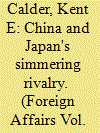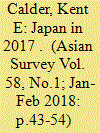| Srl | Item |
| 1 |
ID:
006282


|
|
|
|
|
| Publication |
London, Nicholas Brealey, 1996.
|
| Description |
xi, 253p.
|
| Standard Number |
1857881605
|
|
|
|
|
|
|
|
|
|
|
|
Copies: C:1/I:0,R:0,Q:0
Circulation
| Accession# | Call# | Current Location | Status | Policy | Location |
| 037963 | 355.82/CAL 037963 | Main | On Shelf | General | |
|
|
|
|
| 2 |
ID:
074746


|
|
|
|
|
| Publication |
2006.
|
| Summary/Abstract |
This paper examines Japanese and South Korean host-nation support (HNS) policies toward American forces deployed in those two countries from a comparative perspective. It finds that both countries provide substantial support for US forces, contrary to the expectations of collective action theory and the assumptions of many international relations theorists about free-riding. Northeast Asian HNS support tends to be both quantitatively substantial and to involve an unusually elaborate range of common support programs, thus constituting a distinctive Northeast Asian model of “burden-sharing.” The specific programs supporting US forces in these two countries were generally designed by local politicians and bureaucrats, with only minimal input from the US, albeit under American pressure. They were implemented in discontinuous fashion, at critical junctures, as during the Gulf War and the first Korean nuclear crisis. These results thus provide useful elaboration of “reactive state” and “critical juncture” interpretations of how East Asian policymaking relates to domestic and international politics.
|
|
|
|
|
|
|
|
|
|
|
|
|
|
|
|
| 3 |
ID:
068241


|
|
|
| 4 |
ID:
077277


|
|
|
| 5 |
ID:
160386


|
|
|
|
|
| Summary/Abstract |
Japanese domestic politics grew more volatile and complex in 2017, as LDP electoral reversals were followed by opposition fragmentation and then conservative consolidation. Foreign policy was dominated by the security challenge of North Korea, but also involved deepened relations with the US and Europe, as well as unanticipated improvement with China and South Korea. Macroeconomic trends were positive, but structural reform proceeded only slowly. Japanese society remained slow to change.
|
|
|
|
|
|
|
|
|
|
|
|
|
|
|
|
| 6 |
ID:
081485


|
|
|
| 7 |
ID:
051400


|
|
|
| 8 |
ID:
065023


|
|
|